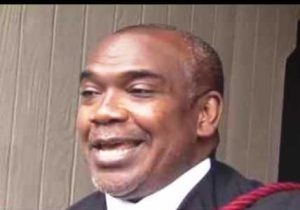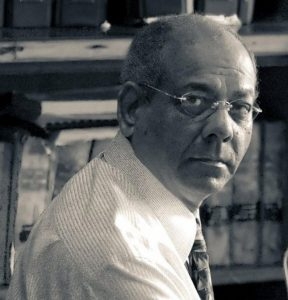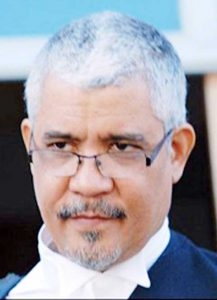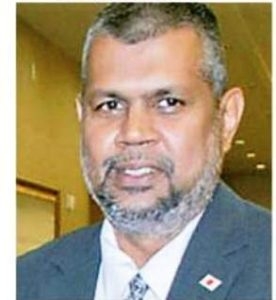Ruling in case against election credibility set for Monday
A Trinidad –based legal team representing the case filed to prevent the Guyana Elections Commission, (GECOM)’s Chief Elections Officer (CEO) Keith Lowenfield from submitting the report of the national recount of the Regional and General Elections have contended that the CEO should be allowed to pronounce on the credibility of the elections in the report which makes way for the declaration of a winner.
The case was filed before the Appeal Court on behalf of Eslyn David, a private citizen last Wednesday. David is seeking court orders in several matters including one which will prevent Lowenfield from submitting the recount report. That report puts the People Progressive Party/ Civic (PPP/C) in the lead by some 15,000 votes ahead of the incumbent A Partnership for National Unity + Alliance For Change (APNU+AFC).

Yesterday, lawyers from both sides of the case presented their oral arguments on the point of the credibility and jurisdiction of the Appeal Court as it regards the elections. The case set for ruling on Monday at the Kingston Appeal Court on Monday at 13:30 hours. At least one from lawyer for the PPP/C has indicated the intention to appeal to the Caribbean Court of Justice, (CCJ) if the case does not conclude in their favour.
ELECTIONS CREDIBILITY
During yesterday’s proceedings, Trinidadian Attorney-at-law, John Jeremie who led the legal team of the applicant (David) advanced arguments that the summation of anomalies and instances of voter impersonation presented in the initial report of the CEO clearly does not appear to satisfy the criteria of in the holding of credible election.

Addressing the Appeal Court via zoom conference, Jeremie referenced letters written by the (APNU+AFC)’s election Agent, Joseph Harmon in which he alleged numerous discrepancies and anomalies which impacted on the credibility of the election. Harmon’s letters formed part of the bundle of evidence referenced in support of the case.
Jeremie is on record for the case along with fellow Trinidadian Attorneys, Keith Scotland and Rondelle Keller as well as Guyanese lawyers, Mayo Robertson and Roysdale Forde.
He has asked the Court to determine a number of questions including whether the CEO can advise the Elections Commission in respect to the Presidential Candidate of each list.

According to the lawyer, Article 177(2) (b) of the Constitution the CEO was empowered to advise the Chairman of the Elections Commission as to the Presidential Candidate that was deemed to be elected based on the issue of more votes cast in favour of that list.
He submitted therefore that the CEO is required after calculating the total number of valid votes of electors which have been cast for each list of electors on the basis of the votes counted and the information furnished by Returning Officers to ascertain the results of the election.
As such, he noted that the question of whether the issue of if more votes are cast” in Article 177 (2) (b) of the Constitution should be interpreted to mean “more valid and credible votes cast” –an issue which he says was contemplated by order number 60 for the elections recount.

“It is therefore submitted,” Jeremie argued, “that under Article 177(2) (b) of the Constitution of Guyana the CEO is empowered to determine valid votes cast in respect of the election of a President and to tender such advice to the Guyana Elections Commission.”
Additionally, the team of lawyers is asking Appellate Judges Dawn Gregory and Rishi Persaud, and High Court Judge Brassington Reynolds to conclude that the Appeal Court has exclusive jurisdiction under Articles 177 (4) of the constitution to hear and determine the case.
Article 177 (4) says – “The Court of Appeal shall have exclusive jurisdiction to hear and determine any question as to the validity of an election of a President in so far as the question depends upon the qualification of any person for election or the interpretation of this Constitution; and any decision of that Court under this paragraph shall be final.”
Though listed as a respondent in the case, Attorney General (AG) Basil Williams supported David’s case. Williams essentially contended that the GECOM failed to determine a final credible count and or the credibility of the result of the General and Regional Elections held on the 2nd day of March, 2020, as required to do by recount order.

He noted to date, no declaration has been made of the elections’ results.
Since this has not occurred, the AG contended that, “GECOM has jurisdiction to declare that the elections are cancelled on the ground of uncovered manifest and pervasive irregularities, anomalies and discrepancies before any declaration of the results of the elections.”
NO JURISDICTION
However, in their submission the team of Attorneys for the People Progressive Party Civic (PPP/C) representatives, Dr. Irfaan Ali and Bharat Jagdeo contended the Appeal Court lacked the jurisdiction to hear this Notice of Motion.
Their central argument is there is no provision that has been made by the Parliament for the determination of questions as to the validity of an election of a President under Article 177 (4).
“In any event, it is clear from the plain wording of Article 177 (4) that it is only capable of being invoked after the election of a President has occurred in which case the present application is premature and made without jurisdiction,” Trinidadian Senior Counsel Douglas Mendes told the Court yesterday.
Mendes who is leading team of Attorneys including Guyana’s Devindra Kissoon, Anil Nandlall, Marcia Nadir Sharma and Sanjeev Datadin argued that the relief sought in the Notice of Motion in any event falls outside of the scope of Article 177 (4) as it neither seeks any interpretation of the Constitution nor the invalidation of an election of President.
“Quite apart from this the relief sought is relief which can only be claimed in an election petition which the Constitution does not permit to be heard in the first instance by the Court of Appeal. There is, in any event, not sufficient evidence placed before the Court of Appeal to permit it to make any determination as to the validity of an election. Such determination can only judicially be arrived at after a trial process capable of and sufficient to permit the resolution of factual disputes,” he said.
Further, Mendes told the Court without prejudice to the foregoing, the jurisdiction of the Court of Appeal under section 177 (4) can only be invoked after a President has been elected, adding “This is clear from a proper construction of the Article 177(2), (4) and (6).”
He noted therefore that the issues have been raised in the application prematurely and should be outlined by way of an Elections Petition. He stressed that the Elections Petitions fall under the sole jurisdiction of the High Court.
At one point in the lawyer’s submission, Justice Gregory sought to inquire why points raised about the alleged anomalies could not be dealt with in this case but were given hearing in the case filed against Region Four Returning Officer Clairmont Mingo in similar proceeding before court.
In this regard, Mendes noted that the case against Mingo is one which the court narrowly determined that the Mingo had breached the procedure outlined for the tabulation of votes.
“This case your honours seeks to raise questions about the credibility of an elections based on issues that should come by way of an elections petition,” Mendes noted.
Similarly Attorney, Kim Kyte-Thomas, for GECOM‘s Chairperson, retired Justice Claudette Singh agreed to the notion that the court lacks jurisdiction. Kyte-Thomas noted that Article 177(4) clothes the Court of Appeal with a narrow special exclusive jurisdiction to hear and determine any question as to the validity of an election of a president in so far as that question turns upon the qualification of any person for election or the interpretation of this constitution.
“The marginal note speaks to the Election of President. Hence it is submitted that the words or the interpretation of the constitution in Article 177(4) relate to interpretation of the constitutional provisions in relation to the qualification of any person for election to the office of the President. The Court of Appeal is therefore not vested with original jurisdiction to hear questions on the interpretation of the constitution outside of this narrow special jurisdiction. It is the High Court which is so vested,” she said.
Kyte-Thomas emphasized that any declaration that GECOM failed to act in accordance with its order and secondly an interpretation of the words “more votes are cast” and the affidavit filed in support do not touch and concern the qualification of a person elected President.
“It is respectfully submitted that the application is misconceived and ought to be struck out forth-with,” she said.
Attorney, Kashir Khan who appeared in association with Mohamed Khan and Mishka Puran for The Citizen Initiative and Change Guyana – two smaller political parties which contested in the 2020 elections also drove home the point of jurisdiction. He stressed that the Court has no jurisdiction to hear the matter since Article 177 (4) of the Constitution relates to the qualification of the President and not the issue of the credibility of an elections or the validity of votes.
The question of interpretation, he argued, under Article 177 2 (b) is not within the preview of the Court of Appeal is distinct and separate from the exclusive jurisdiction conferred in it by Article 177 (4). He said too that the Court of Appeal has no authority to grant restraining orders to prevent Lowenfield from performing his statutory duties as directed by the Chairman of the Commission or in the context of the proceedings.
Senior Counsel, Ralph Ramkarran in his representation of the other parties A New United Guyana (ANUG), The New Movement (TNM) and the Liberty and Justice Party, (LJP) noted that since the Motion has been filed pursuant to the jurisdiction conferred by Article 177(4), it is to be assumed that the Motion would be dealing with the qualification of a person who has been elected President or any interpretation of the Constitution as regards the qualification of that person.
The words “as to the validity of an election of a President” in Article 177(4), quoted above, can only mean that in order to invoke the Article the President must already have been elected.
He too stressed that since the President has not been elected, the court lacks jurisdiction to determine the issues outlined by the applicant.






















